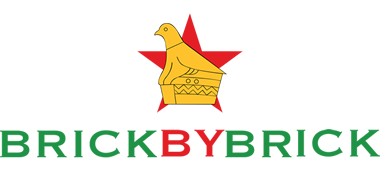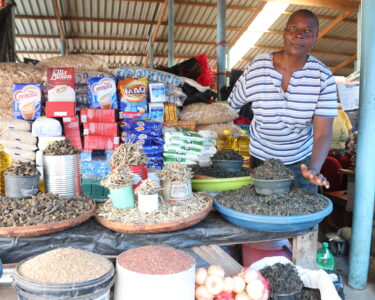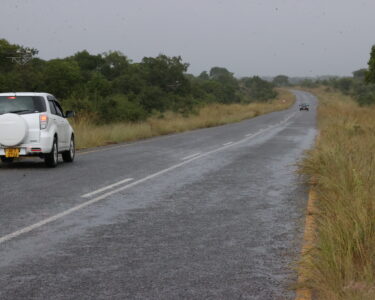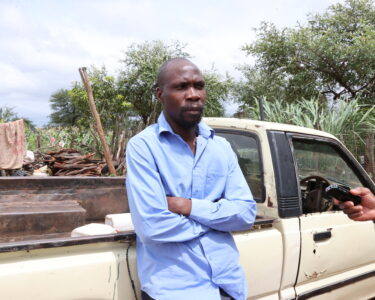One of the happier provinces in the country is Masvingo where, according to the District Development Officer for the province, Lust Magwati, service delivery by the local authorities has increased rapidly, thanks to the Second Republic’s devolution programme which disburses funds from the national Treasury for development at the local level. “We are so happy with the projects we have done so far,” Magwati told Brick by Brick. “They are bringing a good image for the Second Republic and a good service delivery for the people. That is what they want … The progress is pleasing.” Magwati was interviewed by our managing editor, Baffour Ankomah.
Q: What does your department do in the development of the province? What is your role?
A: My role is to identify the need for development in the whole province and to bring about programmes that improve the livelihoods of our communities in terms of health, education, and business. We are also there to improve the industrial capacity of the province in order to make life better for our people.
Q: Since the Second Republic came into being, what has your outfit done concretely?
A: We have been in charge of the implementation of devolution programmes where the government, through the Ministry of Finance, provides funds called the “Inter-Governmental Fiscal Transfers”, that is 5% of the national GDP which is given to local authorities to implement devolution programmes. The local authorities then do ward profiling to identify different projects that need to be implemented in different wards.
From there, we identify the areas of priority. For example, do we build a school in Ward 1, or a hospital in Ward 2, or a road in Ward 3? My role is to prioritise these things and advise the local authorities on which project to implement, so that we quickly provide a service where it is demanded.
Q: If we are to go into specifics, what would you say are some of the projects that have been implemented through your coordinating role?
A: As the district development economist for Masvingo, I am running two local authorities – the Masvingo City Council and the Masivingo Rural District Council (RDC).
For the Masvingo City Council, we have implemented more than 6 projects. The biggest is a trunk sewer to improve the sewerage system and to connect locations that are not yet on the drainage system. The second biggest project is the building of a secondary school, the Rujeko Secondary School in Masvingo, one of the largest urban secondary schools built in this country by a local authority.
The City Council has also built a clinic in Masvingo which is now open to patients, called the Northwest End Clinic. It has a large catchment area and has helped to decongest the population in that area of the city.
Regarding rural Masvingo, the Masvingo RDC has implemented 13 projects that have been funded by devolution. The majority of them are clinics, schools, and roads.
Q: You mentioned that the Masvingo City Council has implemented 6 projects, but you have talked about only two, can you talk about the rest?
A: Yes, the City Council has not only built market stalls in Masvingo town, but has also built an improved solar-powered water system in addition to providing good boreholes in the army barracks and improving the provision of water there – all funded by devolution.
Q: Now, what has happened in rural Masvingo?
A: I have talked about social services in terms of health, education and roads. The Masvingo RDC has built one of the best primary schools in the country, the Chirichoga Primary School, which has enrolled pupils up to Grade 5. It is improving enrolment each year, and more classroom blocks will be added as we go along. So education is being provided from devolution funds.
The Masvingo RDC has also built 6 clinics through devolution, 4 of them have already opened their doors to patients. At the other clinics, the RDC just added maternal wings to the already existing facilities. These maternal blocks were very necessary, especially at one critical area called Chisase in Ward 30 where 35 deliveries on the average were being recorded every month.
So we built a clinic there. It shares borders with Chiredzi. The people there used to walk long distances, sometimes 20 km, to access health facilities. The new clinic’s catchment area includes areas inhabited since the 2000 land reform programme. All those people did not have a clinic, but now they have it at Chisase. Their health needs are now covered.
The Masvingo RDC has also more projects that are not yet completed. Some of them are over 70% complete or over 90% complete, especially the main clinic blocks.
Q: Are you happy with the progress that the Masvingo Province has made generally under the Second Republic?
A: The progress is quite pleasing. Our appointment as provincial development economists has helped in a great way. We came after the New Dispensation came into being. Before then there were no provincial economists, so our presence in this dispensation has added value to the performance of the province as the communities are receiving a higher delivery of services. As such, they appreciate our presence because we are implementing a lot of devolution projects for them.
Already, the vast distances that students and pupils used to walk to go to school have been reduced because we have built more schools through devolution. So working in an environment where you are producing results that improve and impact lives makes our jobs very pleasing.
Q: What has been the response of the communities?
A: The communities have been very supportive because the majority of the projects were community initiatives and community driven. Some communities even provided free labour to build the clinics and schools in their areas.
A special mention must be made of the role played by local councillors who are the primary agents when it comes to local development. They coordinate grassroot activities all the way from the ward level to the district level. In Masvingo rural, we have seen councillors who have initiated development in their local areas. So there is high support from the communities to the devolution projects.
Q: What are some of the challenges you have faced, or still facing, that are hampering the smooth progress of Masvingo Province?
A: Every year we do the budget for our local authorities and state the projects that we want to implement and their overall costs. We submit these to head office and expect a timeous disbursement of the devolution funds. But the timing of the disbursements has become a problem. The funds don’t come on time, when they are needed.
And when they come, they come in small lots, which does not help in the quick delivery of projects. In 2019-2020 for example, we received our disbursements nearly at the end of the year, which affected our ability to deliver as inflation and the exchange rate ate into our funds.
The exchange rate has become another key challenge because we receive our funds in local currency but some of the raw materials for our projects are priced in US dollars. But as local authorities, we pay in RTGS while our suppliers sell in exchange-rate prices. This affects our ability to deliver services quickly. So the challenge is the timing of disbursements, the funds coming in small lots from the Treasury, and the high exchange rate regime.
Q: There are people in Masvingo who haven’t travelled across the province, so they don’t know what is happening. Such people tend to say, flippantly sometimes, that there is nothing going on. What is your message to such people?
A: The New Dispensation is very evident to every person. Only those who are dull-minded say there is nothing happening, because a lot of infrastructure is being built. People need services, and these are being delivered under the Second Republic, under devolution. We have talked about health, education and the road network. These are the basic services that are demanded by the people and these are the real services that we are providing under devolution.
Therefore, people just need an open mind to see and perceive what is happening, because what we are doing is not hanging in the air. I have told you that the Masvingo RDC has implemented 13 projects under devolution. We have 35 wards in rural Masvingo, and some of the projects we have implemented cut across ward boundaries, which means the nearest ward is serviced by the next ward. This is very evident to everybody.
In terms of Masvingo Urban, the new clinic, the market stalls, and the 4 other projects we talked about are serving all the 10 wards of the city, which means the services being provided are evident to everybody.
Q: Is there anything you want to say that I haven’t asked you?
A: Basically, I want to make an appeal: The disbursement of devolution funds should come in large amounts so that they can make an impact on what the people are implementing. Take for an example, the building of a school requires a lot of money and when it comes in small lots, it makes only small progress. At the end of the day, it delays the delivery of the service.
Yes, we know that revenue creation is one of the responsibilities of local authorities, but the coming in of devolution funds has helped massively and resulted in a rapid increase in service delivery and the construction of infrastructure by local authorities. Long may this continue.
So I am saying that devolution and its funds should not be removed as they are bearing good fruits in terms of service delivery, and adding to the impact and image of local authorities.
Q: How would you summarise the projects implemented so far in the province?
A: We are so happy with the projects we have done so far. They are bringing a good image for the Second Republic and a good service delivery for the people. That is what they want.
The projects are not limited to one area. They are everywhere – in education, health, road network, and agriculture. So the Second Republic is providing services that were not there previously.
Therefore, I am saying that people’s lives are improving in terms of income-generating projects and even their health status. Their wellbeing is generally improving because of the services that are being provided by the Second Republic.









